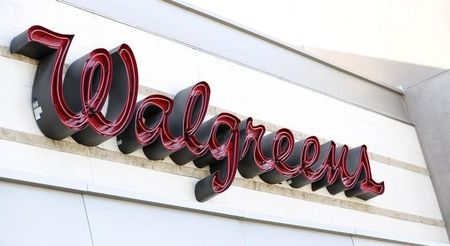By Emma Thomasson
(Reuters) - U.S. retailer Walgreen Co (N:WAG) won't use a full takeover of Europe's biggest pharmacy chain Alliance Boots [ABN.UL] to move its domicile overseas, it said on Wednesday, following fierce criticism of such tax-cutting deals at home.
Walgreen said it would exercise an option to buy the 55 percent it does not already own of Alliance Boots for 3.13 billion pounds in cash and 144.3 million shares, giving a total value for the deal of about $15 billion. It took a 45 percent stake in 2012 and was expected to buy the rest.
The U.S. group added the combined company, with more than 11,000 stores in 10 countries, would keep its tax domicile in the United States, with headquarters in the Chicago area. It is targeting combined revenue for 2016 of $126-130 billion.
Walgreen's retreat is the third major possible tax "inversion" deal to collapse in recent months amid heightened political sensitivity in the United States to such transactions.
Walgreen had been under pressure from investors to shift its tax domicile to Switzerland or Britain as part of a buyout of Alliance Boots, but the administration of President Barack Obama said on Tuesday it was considering steps to curb such deals.
Walgreen said it was mindful of the public reaction to a potential inversion deal and its role as an "iconic American consumer retail company with a major portion of its revenues derived from government-funded reimbursement programs".
"The company concluded it was not in the best long-term interest of our shareholders to attempt to re-domicile outside the U.S.," CEO Greg Wasson said in a statement, adding it could not find a structure it was sure could withstand extensive scrutiny from the U.S. tax authorities.
Walgreen shares were down nearly 10 percent at $62.50 in premarket trading. After news leaked on Tuesday that the group would not do an inversion deal, shares in the company fell 4.4 percent in regular trading to end at $69.12. Goldman Sachs and Lazard are advising Walgreen on the transaction.
In an inversion, a U.S. corporation buys or sets up a foreign company and then moves its tax domicile to that foreign company and its home country, while leaving core business operations in the United States. Doing such a deal ends U.S. taxation of the company's foreign profits and makes it easier for the company to take other tax-cutting steps.
PATRIOTIC CUSTOMERS
Senator Richard Durbin, the senior U.S. senator from Walgreen's home state who is personally close to Obama, had publicly urged the company not to go through with an inversion. Obama himself formerly was a senator for Illinois.
"I believe you will find that your customers are deeply patriotic and will not support Walgreen's decision to turn its back on the United States," Durbin wrote to Wasson in July.
Walgreen announced a new goal for adjusted earnings per share (EPS) for fiscal 2016 of $4.25-$4.60 and said it was accelerating cost reduction initiatives to achieve $1 billion in savings by the end of fiscal 2017, including corporate, field and store-level cuts.
It also said it planned a new $3 billion share repurchase program.
Walgreen, which expects to close the transaction in the first quarter of 2015, will blend senior management from both companies, with Wasson to be president and CEO and Alliance Boots executive chairman Stefano Pessina to become executive vice chairman, responsible for strategy and mergers and acquisitions.
ALLIANCE BOOTS ALSO IN TAX ROW IN UK
A consortium led by billionaire Pessina and private equity group Kohlberg Kravis Roberts & Co. L.P. (KKR) took Alliance Boots, which runs the Boots chain of pharmacies that dot main streets across Britain, private in 2007.
Alliance Boots has itself come under attack in the UK for schemes to cut its tax bill, with a charity and a labour union accusing the firm last year of avoiding over 1.1 billion pounds in UK tax since 2008.
Alliance Boots responded by saying it conducts its business and organises its tax affairs strictly in compliance with all applicable law and observes the highest standard of good ethics.
The Obama administration said on Tuesday it was considering administrative actions to discourage inversions, though there are limits to what the Treasury can do without action by Congress.
Nine inversion deals have been agreed to this year by U.S. companies ranging from banana distributor Chiquita Brands International Inc (N:CQB) to drugmaker AbbVie Inc (N:ABBV) and more are being considered. The transactions are occurring at a record pace since the first inversion three decades ago.
But two large inversions recently collapsed: one involved U.S. drugmaker Pfizer Inc (N:PFE); and the other, U.S. advertising company Omnicom Group Inc (N:OMC). Both had targeted European rivals for acquisition, with a tax domicile move abroad included in their plans, but the deals unraveled.

(Additional reporting by Siddharth Cavale; Editing by Mark Potter)
